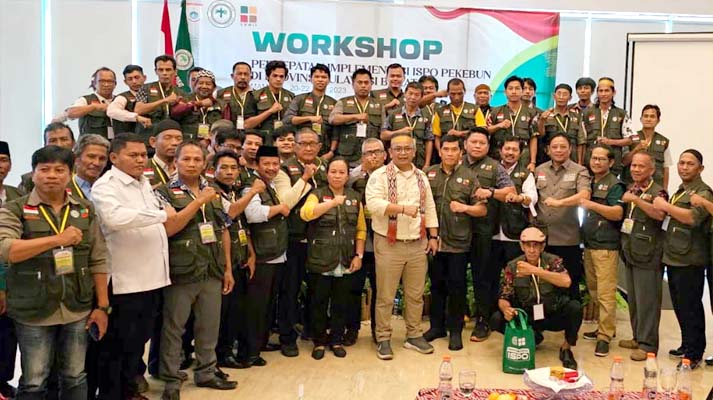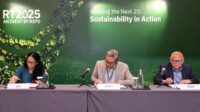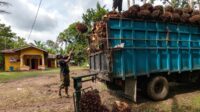PALMOILMAGAZINE, JAKARTA – The workshop organized jointly by DPP Apkasindo (Asosiasi Petani Kelapa Sawit Indonesia) and DPW Apkasindo West Sulawesi Province, with support from the Pam Oil Plantation Fund Management Agency, yielded valuable improvement recommendations.
Held on Friday (21/7), the workshop focused on the future of smallholders beyond 2025 when ISPO compliance is set to become mandatory for all planters. The discussion revolved around how smallholders, especially those in Mamuju, West Sulawesi Province, can effectively implement ISPO considering their existing limitations.
Chairman of DPP Apkasindo, Gulat Medali Emas Manurung said, there are five reasons why smallholders just reached 0,31% getting ISPO certificate since 2011, they are, the first, smallholders’ palm oil plantation status that Ministry of Environment and Forestry (MEF) claimed; the second, smallholders are difficult to get cultivation documents; the third, smallholders are not familiar with environment permit; the fourth, minimum notes about cultivation business; and the fifth, the implementation of good agricultural practices. These five are the absolute terms and conditions to get ISPO.
Also Read : Enhancing Palm Oil Product Diversification: Technical Training for MSMB in Babel
Besides, he continued, there are three other external factors why the smallholders are minimal to get ISPO certificate, they are, the first, lots of money to complete the terms and conditions in ISPO namely in getting certification institution; the second, there is no premium price of fresh fruit bunch that got ISPO certificate; and the third, minimum knowledge about ISPO.
“I heard a rumor that President’s Regulation Number 44 / 2020 about ISPO is being revised. This is the chance to get whole evaluation so that ISPO would become the same idea, not only a project from (many) consultant that formulated ISPO,” he recently said, as in the official statement to beige-heron-208544.hostingersite.com.
Manurung continued, Coordinator Ministry in Economy that is in charge about ISPO should evaluate the issue, not multiply the regulation and other obligation.
“Why did I say rumor? Because as smallholders that should implement the regulation, we were and are never invited to participate to deliver inputs. If ISPO is being revised, this is too much,” he said and continued, “This is suspicious, Minister Airlangga should have known this weird to revise ISPO before it is too late.”
Also Read : Two Schemes – ISPO and RSPO Keep Running to be Harmonized
Meanwhile, Chairman of DPW Apkasindo West Sulawesi Province, Andi Kasruddin Rajamuda said, it is a voluntary for smallholders to implement ISPO. They are confused still.
“When it would be mandatory, the smallholders would panic. It will be in 2025,” he said.
There were some strategic conclusions from the workshop. The first is that the smallholders fully support sustainable palm oil plantation, that is why, ISPO revision should cover two options – the first, get smallholders to be still voluntary (in ISPO regulation) or make two clusters of ISPO, such as, absolute one for corporate and relative for smallholders (relative ISPO for smallholders should be divided into some clusters). The second, ISPO should get more expensive fresh fruit bunch. The third, ISPO revision should not be formulated by consultant. It needs to involve smallholders’ associations from the beginning to the end. (T2)





































